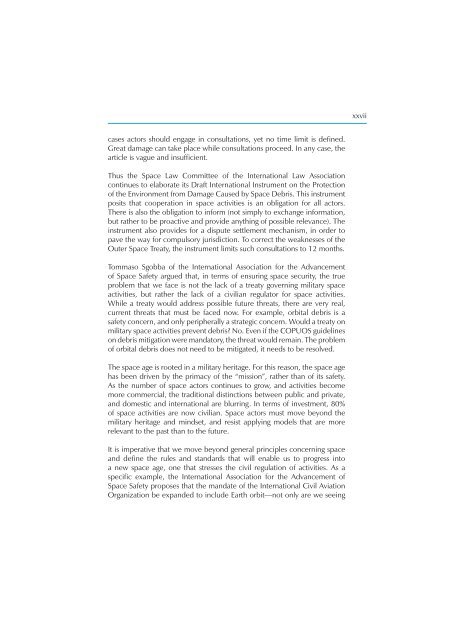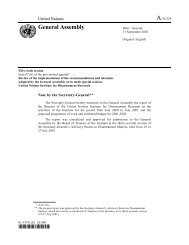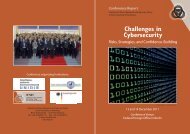Security in Space The Next Generation - UNIDIR
Security in Space The Next Generation - UNIDIR
Security in Space The Next Generation - UNIDIR
You also want an ePaper? Increase the reach of your titles
YUMPU automatically turns print PDFs into web optimized ePapers that Google loves.
cases actors should engage <strong>in</strong> consultations, yet no time limit is defi ned.<br />
Great damage can take place while consultations proceed. In any case, the<br />
article is vague and <strong>in</strong>suffi cient.<br />
Thus the <strong>Space</strong> Law Committee of the International Law Association<br />
cont<strong>in</strong>ues to elaborate its Draft International Instrument on the Protection<br />
of the Environment from Damage Caused by <strong>Space</strong> Debris. This <strong>in</strong>strument<br />
posits that cooperation <strong>in</strong> space activities is an obligation for all actors.<br />
<strong>The</strong>re is also the obligation to <strong>in</strong>form (not simply to exchange <strong>in</strong>formation,<br />
but rather to be proactive and provide anyth<strong>in</strong>g of possible relevance). <strong>The</strong><br />
<strong>in</strong>strument also provides for a dispute settlement mechanism, <strong>in</strong> order to<br />
pave the way for compulsory jurisdiction. To correct the weaknesses of the<br />
Outer <strong>Space</strong> Treaty, the <strong>in</strong>strument limits such consultations to 12 months.<br />
Tommaso Sgobba of the International Association for the Advancement<br />
of <strong>Space</strong> Safety argued that, <strong>in</strong> terms of ensur<strong>in</strong>g space security, the true<br />
problem that we face is not the lack of a treaty govern<strong>in</strong>g military space<br />
activities, but rather the lack of a civilian regulator for space activities.<br />
While a treaty would address possible future threats, there are very real,<br />
current threats that must be faced now. For example, orbital debris is a<br />
safety concern, and only peripherally a strategic concern. Would a treaty on<br />
military space activities prevent debris? No. Even if the COPUOS guidel<strong>in</strong>es<br />
on debris mitigation were mandatory, the threat would rema<strong>in</strong>. <strong>The</strong> problem<br />
of orbital debris does not need to be mitigated, it needs to be resolved.<br />
<strong>The</strong> space age is rooted <strong>in</strong> a military heritage. For this reason, the space age<br />
has been driven by the primacy of the “mission”, rather than of its safety.<br />
As the number of space actors cont<strong>in</strong>ues to grow, and activities become<br />
more commercial, the traditional dist<strong>in</strong>ctions between public and private,<br />
and domestic and <strong>in</strong>ternational are blurr<strong>in</strong>g. In terms of <strong>in</strong>vestment, 80%<br />
of space activities are now civilian. <strong>Space</strong> actors must move beyond the<br />
military heritage and m<strong>in</strong>dset, and resist apply<strong>in</strong>g models that are more<br />
relevant to the past than to the future.<br />
It is imperative that we move beyond general pr<strong>in</strong>ciples concern<strong>in</strong>g space<br />
and defi ne the rules and standards that will enable us to progress <strong>in</strong>to<br />
a new space age, one that stresses the civil regulation of activities. As a<br />
specifi c example, the International Association for the Advancement of<br />
<strong>Space</strong> Safety proposes that the mandate of the International Civil Aviation<br />
Organization be expanded to <strong>in</strong>clude Earth orbit—not only are we see<strong>in</strong>g<br />
xxvii








